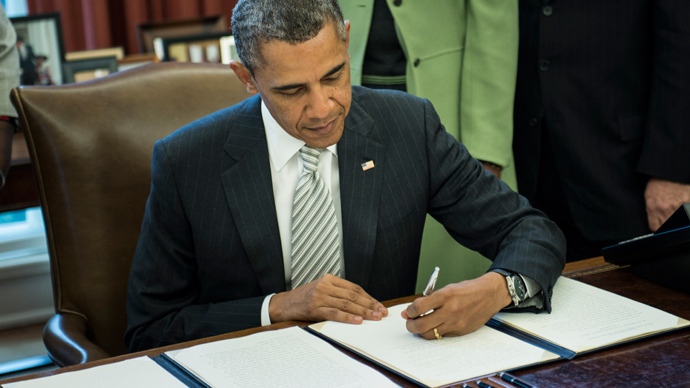
Once again, the largest corporations and their governmental cohorts succeeded in sealing their dominance over our lives without any oversight, transparency or leniency. This time it concerns food safety, as Monsanto and lobbyists have shoved through dangerous legislation that effectively makes any oversight of GMO food void.
The Monsanto Protection Act, which President Obama signed into law this week, will strip judges of their constitutional mandate to protect consumer rights and the environment, while opening up the floodgates for the planting of new untested genetically engineered crops, endangering farmers, consumers and the environment. The result is that GMO crops will be able to evade any serious scientific or regulatory review.
The insistence of our government, and of corporations, is stunning. Like the civil liberties-violating CISPA law that is now being re-introduced in Congress after a year of languishing, Monsanto and its lobbyists are re-introducing the same provisions in the 2013 Farm Bill as they did in 2012. Lobbyists and politicians are relying on Americans’ amnesia to push through their secretive, sweeping agendas.
Modest amendments to the Farm Bill proposal in 2012 were shot down. The Sanders Amendment, introduced by Senator Bernie Sanders of Vermont, was struck down by a 73-26 vote, 28 of which were Democratic. Sanders sponsored earlier legislation popularly known as the Vermont Right to Know Genetically Engineered Food Act, but Vermont lawmakers allowed the bill to stall after a representative threatened to sue the state if it passed, based on claims that food oversight should not be delegated to the states but handled by the FDA.
Monsanto is no stranger to our political and judicial system – especially when it comes to influencing it. Currently eight lawmakers own stock in Monsanto: Sen. Kay Hagan (D-North Carolina) and Reps. Dave Camp (R-Michigan), Joe Kennedy III (D-Massachusetts), Alan Lowenthal (D-California), Michael McCaul (R-Texas), Jim Renacci (R-Ohio), Jim Sensenbrenner (R-Wisconsin) and Fred Upton (R-Michigan).
Additionally, according to Open Secrets, Monsanto spent nearly $6 million on lobbying in 2012 and contributed about $500,000 to federal candidates in the last election.
As a couple of other examples of the breadth of Monsanto’s political influence, The Bill and Melinda Gates Foundation, a purportedly philanthropic organization fund established by Bill Gates, purchased 500,000 shares in Monsanto back in 2010, valued at more than $23 million.
And then there's the election last fall in California where Proposition 37, which would have mandated the labeling of genetically modified organisms in the state, was debated at great cost - and violations of the truth - before its eventual defeat. Monsanto poured about $8,112,000 into advertising and political campaigns against the legislation. The same organization claimed that the No to 37 campaign, largely funded by Monsanto, fabricated a quote that bore the FDA official logo. The quote read:
“The [FDA] says a labeling policy like Prop 37 would be ‘inherently misleading.’”
The campaign supporting Proposition 37 sent a letter to the Justice Department demanding action against the No to 37 campaign for its flagrant violation of law, specifically section 506 of the U.S. Criminal Code. But we should expect no comment or action from the department.
Regarding its influence on the judicial system, Monsanto recently wrapped up a Supreme Court case in which it pressed charges against an Indiana soybean and wheat farmer, Vernon Hugh Bowman, whom it accused of breaking a patent agreement on second-generation Roundup Ready soybean seeds.
Bowman bought the seeds from a grain elevator after a farmer, who had purchased Monsanto’s seeds legally, sold them to the grain elevator. The case made it all the way to the Supreme Court, whose line of justices includes a former lawyer for Monsanto: Clarence Thomas. Thomas did not recuse himself from the case. The verdict has yet to be decided, but food advocacy groups are apprehensive about the ruling.
Monsanto devotes about $10 million a year and 75 staffers to investigating farmers for possible patent violations. 93 percent of soybeans, 88 percent of cotton and 86 percent of corn in the U.S. are grown with Monsanto’s patented seeds.
Just as central and major commercial banks are attempting to control the economy, just as corporations and other large entities are attempting to control our politics and elected officials, just as large oil companies are attempting to control the debate on climate change and the environment in general, biotech and agriculture giants are attempting to control food production through patented, genetic manipulation, using dirty political clout to support it and a lack of judicial or legislative oversight to continue it.
3 WAYS TO SHOW YOUR SUPPORT
- Log in to post comments












